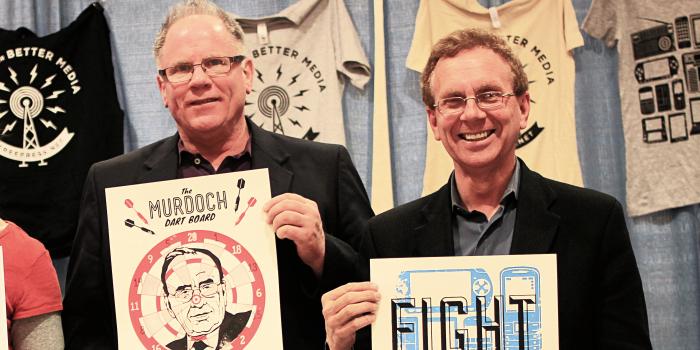Press Release
Free Press: FCC Ignores Public by Pushing Failed Ownership Policies
Contact: Timothy Karr, 201-533-8838
WASHINGTON -- On Thursday, the Federal Communications Commission proposed rules that would further weaken media ownership limits for local newspapers and broadcast stations. The agency's proposal is strikingly similar to one adopted in 2007 under former FCC Chairman Kevin Martin. Those rules were met with overwhelming public opposition from across the country, as well as from bipartisan leaders in Congress, and were thrown out by a federal appeals court last summer.
The FCC is required by Congress to review its media ownership rules every four years. Today's proposal also tees up a number of critical issues that the FCC is expected to address in the coming months, including the growing problem of covert consolidation of broadcast television stations through shared services arrangements.
Free Press President and CEO Craig Aaron made the following statement:
"The FCC must be having a Yogi Berra moment, because it’s déjà vu all over again on the failed policies of the previous administration. Those policies were resoundingly rejected by the public, Congress and the courts. The FCC should focus on remedying the mistakes of past administrations — not repeating them.
"This action not only flies in the face of promises made by the president on the campaign trail but will also make it much harder for local and diverse owners to secure a piece of the public airwaves. Instead, the already dwindling number of smaller and independent media owners will be swallowed up by the same media giants that have crushed local journalism, killed local radio and left us with the same cookie-cutter content from coast to coast.
"Especially appalling is the FCC's failure — once again — to meaningfully address the issue of ownership diversity. A federal court has twice rebuked the FCC for failing to consider rules that would increase ownership opportunities for women and people of color, yet today's item punts on the issue yet again. The evidence shows that media consolidation hinders opportunities for women and people of color to create and sustain broadcast businesses. If the FCC is serious about addressing the diversity problem, it needs to tighten its rules, not relax them.
"However, we do commend the FCC for raising the important issue of covert consolidation. The FCC must address the proliferation of secret deals to combine local newsroom operations in violation of the agency's rules. Some broadcasters now control two, three or even four stations in one market, giving a handful of companies extraordinary influence over local debates, issues and news. Now is the time for the FCC to close the legal loopholes and rein in these so-called shared services agreements. Otherwise broadcasters will continue to undermine competition, destroy news diversity and cut jobs in local communities.
"Fortunately, the rules proposed today are not final. The FCC can still reverse course, reject the disastrous approach of its predecessors and refocus on policies that will benefit the public instead of just boosting the bottom line of a few giant media conglomerates."
The FCC is required by Congress to review its media ownership rules every four years. Today's proposal also tees up a number of critical issues that the FCC is expected to address in the coming months, including the growing problem of covert consolidation of broadcast television stations through shared services arrangements.
Free Press President and CEO Craig Aaron made the following statement:
"The FCC must be having a Yogi Berra moment, because it’s déjà vu all over again on the failed policies of the previous administration. Those policies were resoundingly rejected by the public, Congress and the courts. The FCC should focus on remedying the mistakes of past administrations — not repeating them.
"This action not only flies in the face of promises made by the president on the campaign trail but will also make it much harder for local and diverse owners to secure a piece of the public airwaves. Instead, the already dwindling number of smaller and independent media owners will be swallowed up by the same media giants that have crushed local journalism, killed local radio and left us with the same cookie-cutter content from coast to coast.
"Especially appalling is the FCC's failure — once again — to meaningfully address the issue of ownership diversity. A federal court has twice rebuked the FCC for failing to consider rules that would increase ownership opportunities for women and people of color, yet today's item punts on the issue yet again. The evidence shows that media consolidation hinders opportunities for women and people of color to create and sustain broadcast businesses. If the FCC is serious about addressing the diversity problem, it needs to tighten its rules, not relax them.
"However, we do commend the FCC for raising the important issue of covert consolidation. The FCC must address the proliferation of secret deals to combine local newsroom operations in violation of the agency's rules. Some broadcasters now control two, three or even four stations in one market, giving a handful of companies extraordinary influence over local debates, issues and news. Now is the time for the FCC to close the legal loopholes and rein in these so-called shared services agreements. Otherwise broadcasters will continue to undermine competition, destroy news diversity and cut jobs in local communities.
"Fortunately, the rules proposed today are not final. The FCC can still reverse course, reject the disastrous approach of its predecessors and refocus on policies that will benefit the public instead of just boosting the bottom line of a few giant media conglomerates."




